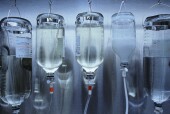
THURSDAY, June 17 (HealthDay News) — Cuts in Medicare payments to doctors who administer outpatient chemotherapy drugs actually led to an increase in treatment rates among Medicare recipients, finds a new study.
“This sort of dynamic runs contrary to what most people would expect, but economists often encounter this sort of thing,” Joseph Newhouse, a professor of health policy and management at Harvard University, said in a Harvard news release.
Oncologists can purchase chemotherapy drugs directly from pharmaceutical companies for far below the suggested cost and then bill the patient’s insurer the full suggested cost, sometimes making more than a 20 percent profit, according to background information in the news release.
But under the 2005 Medicare Modernization Act, Medicare no longer automatically pays what physicians bill. Instead, Medicare calculates the average amount that physicians typically pay for each chemotherapy drug and reimburse no more than 6 percent above this average cost.
When the payment cuts were introduced, critics said patient care would suffer, the study authors noted.
In the new study, Newhouse and colleagues analyzed Medicare claims for 222,478 beneficiaries diagnosed with lung cancer between 2003 and 2005. On average, chemotherapy treatment within one month of diagnosis increased 2.4 percent after the new rules took effect, from 16.5 percent to 18.9 percent.
In addition, the use of more costly chemotherapy drugs increased, while the use of less-expensive drugs declined, the researchers found.
The study, published online June 17, appears in the July print issue of the journal Health Affairs.
“Physicians don’t always respond to incentives the way most people expect, but in this case they do respond in a way that makes sense to economists. It seems logical on the one hand that when you pay less, you get less. However, in this case, since a high proportion of an oncologist’s income depends on prescribing, paying less per drug results in more drugs,” study first author Mireille Jacobson, of the non-profit RAND Corp., said in the news release.
More information
The U.S. National Cancer Institute has more about chemotherapy.

